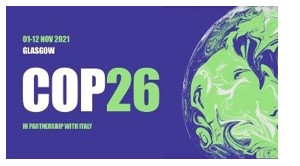
We are glad to share with you a report on COP26 (now about the second week of the Climate Conference) written by Jean Quinn, DW, Executive Director of UNANIMA International.
They are a Non –Governmental Organization (NGO) advocating on behalf of Women and Children, Homeless and Displaced, Migrants and Refugees, and the Environment primarily at the United Nations.
They aim to educate and influence policy makers at the global level and work for systemic change to achieve a more just world. We MSCs are proud to be members of UNANIMA.
Dear Friends,
Keeping up with the daily COP 26 news was as challenging as the topic itself!
One significant highlight of the Climate Summit for us, as women religious, was that people of faith from around the world spoke out, especially about the moral implications of the irresponsible economic choices that fuel global warming. The 40 faith leaders that met with Pope Francis before the conference reminded us that we were in a moment of opportunity and truth. The Faith Leaders’ declaration stated that, “Future Generations will never forgive us if we squander this precious opportunity…We have inherited a garden: we must not leave a desert to our children.” See the full declaration here:
The Final Journey of COP 26 from November 8-13, 2021 was a blizzard of pledges, with countries promising to end and reverse deforestation, phase out coal, and reduce methane emissions by 30% by 2030. The delegates entered the talks charged with keeping the 2015 Paris Agreement goal of limiting temperature rises to 1.5 C degrees within reach. After two weeks of painful negotiations, nearly 200 nations came together in the final days to work out a global deal to combat climate change. However, it fell short of what science says is needed to contain dangerous rising temperatures. In addition, rich countries stood accused of failing at the COP 26 summit for not delivering much needed financial aid to vulnerable states that are at risk of drought, rising sea levels, fire, and storms.
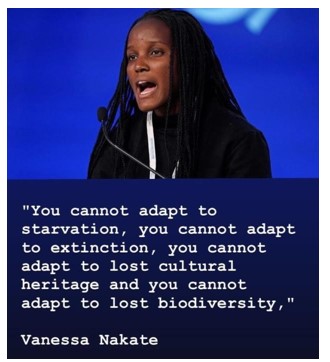
President of COP 26, Alok Sharma, rounded up the negotiations telling delegates: “it is now decision time. And the choices you are set to make are vitally important.” Unfortunately, in a late development, China and India insisted that language on fossil fuels be weakened in the final summit decision text. So now, after more than two weeks of tough negotiations, shock announcements, and late-night huddles, COP 26 has ended. As the final deal was clinched, a tearful Alok Sharma said “I apologize for the way this process has unfolded. I am deeply sorry,” before banging down his gavel.
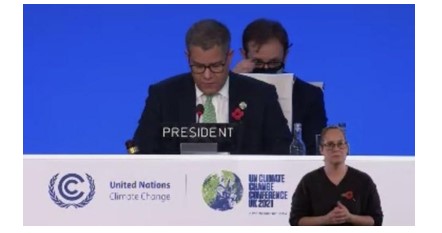
The final agreement known as the Glasgow Climate Pact, has been signed by 197 countries, ranging from the big emitters such as China and India, to the small island states whose very
existence is imperiled by the climate crisis. Reached by consensus, the document keeps alive hopes of keeping global temperatures at 1.5 C above the pre-industrial levels by the end of the century—the aspiration of the Paris Agreement. The outcome document from COP 26, “The Glasgow Climate Pact,” can be viewed here
10 Key Takeaways from the Agreement
Countries were ‘requested’ to set tougher 2030 Climate plans
A crucial element of the new deal is a request for countries to ‘revisit and strengthen’ their 2030 climate plans by the end of 2022. Before this, countries were not expected to come back with new national climate plans until 2025. Alok Sharma, President of COP 26, called on all 200 countries to report their progress towards more climate ambition next year at COP 27, set to take place in Egypt.
Fossil Fuels feature for the first time – with a last-minute adjustment
There was a call to accelerate “phasing out” inefficient fossil fuel subsidies, and “phasing down” unabated coal power, which refers to coal power that is not tied to a still-emergent technology for capturing CO2 emissions. As stated above the language was weakened at the very last minute, with India calling for a “phasing down” to replace a firmer “phasing out” during the conference’s final plenary. India’s move prompted an emotional response, as evidenced by the apology of Alok Sharma, President of COP 26. However, despite this late change to the document, it is the first time that a mention of fossil fuels—the major driver of the climate crisis—has been included in a UN climate document of this kind.
Alarm and concern over the current pace of global warming
There was much alarm and concern about the fact that humans have already caused global temperatures to increase by 1.1 C since the start of the industrial era, causing impacts in every region of the world.
Rich world expresses “deep regret” over broken finance promises
The final agreement from Glasgow expresses “deep regret” that a long-held promise from wealthy nations to provide $100 billion in funding by 2020 to poorer countries, grappling with climate impacts, was NOT met. The text calls on developed countries to deliver on the $100 billion “urgently,” and through to 2025.
Developed countries agree to double funds to poorer nations
As part of the pact, developed countries have pledged, by 2025, to double the amount they spend on helping poorer countries adapt to climate impacts from 2019 levels. This comes after the UN Report published last week found that the cost of climate impacts in developing countries is between five and ten times higher than the amount of financial aid on offer from rich nations ahead of the conference. See the Emissions Gap report here
Developing world disappointed over loss and damage
Despite some progress on finance, developing countries left Glasgow largely dissatisfied on the issue. Many developing countries had called for creation of a financial assistance program to help them deal with the “loss and damage” caused by the climate crisis,” such as the loss of human life during extreme weather events.
Call to curb methane by 2030
The text invites countries to consider how they will cut methane, a short-lived but potent greenhouse gas created by animal agriculture and fossil fuel production, over the next decade.
Mention of “nature-based solutions’ is deleted
Nature-based solutions and tools to tackle the climate crisis, such as harnessing natural habitats, were billed to play a major role at COP 26. However, it ended up getting cut from the final agreement.
Paris rule book finalized
The new texts agreed upon in Glasgow saw countries finally tie up the remaining sections of the rulebook from the Paris Agreement. This included new rules on “transparency.” All countries will now have to report emissions and progress every two years. This should give observers a clearer picture on whether nations are living up to their climate promises.
Role of Indigenous people, youth and children ‘recognized’
The final text from Glasgow makes a specific mention of the “important role” that “indigenous peoples, local communities, youth, children, local and regional governments,and other stakeholders” play in tackling the climate crisis. Young activists called for the voices of children to be heard.
Delegates’ Reflections
COP 26 President, Alok Sharma
“I think we can say today with credibility that we’ve kept 1.5 C within reach. But its pulse is weak, and we will only survive if we keep our promises…Observers said the agreement fell short of what is needed to avert dangerous warming and to help countries adapt or recoup damages from the disasters already unfurling globally.”
UN Secretary-General, António Gutteres:
Gutteres welcomed the deal, stating that it is “an important step but not enough. We must accelerate climate action to keep alive the goal of limiting global temperature rise to 1.5 degrees.” He said the approved text from COP 26 was an important compromise, but that the “collective political will was not enough to overcome some deep contradictions.” He stated that the texts “reflect the interests, the conditions, and the state of the political will in the world today.” But that “our fragile planet is hanging by a thread. We are still knocking on the door of catastrophe.”
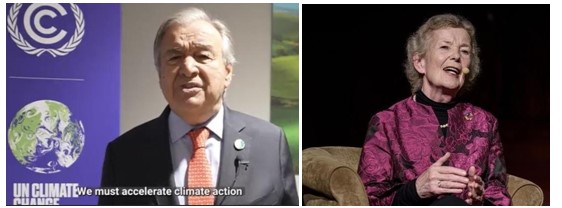
Mary Robinson, Chair of the Elders
Visibly moved to tears, Mary Robinson said that “not enough leaders are in crisis mode.” She said poorer countries, notably those in the Climate Vulnerable Forum, were in a “crisis mindset” and seeking a meaningful outcome. She warned leaders: “this is on your watch…
It is important. We are talking about having a safe future.” She said she needed to call out the leaders of Saudi Arabia, Russia. Brazil, China, and Australia as having not made sufficient commitments, and often being the main blockers to progress.
Greta Thunberg:
The teenage activist said that, for her, COP 26 was a failure. She believed that it had turned into a “PR event to fight for the status quo,” and compared it to a global north greenwash festival.’ She said “the real work continues outside these halls. And we will never give up, ever.”
Representative from Fiji, Aiyaz Sayed-Khaiyum:
Criticized the proposed change to call on parties to “phase down” rather than “phase out” coal. He said, “what we would like to express is not just our immense disappointment but in the manner in which it has been introduced.”
Frans Timmermans, EU Executive Vice President
Said he was disappointed “that the language on coal had been diluted.”
Prime Minister of Barbados, Mia Mottley
She said that for Barbados and other small island states, “two degrees is a death sentence.”
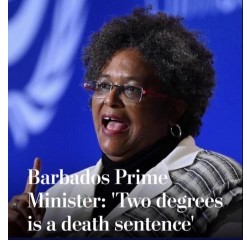
Activists from the Marshall Islands, India, USA, South Africa
Youth climate activists from around the world are filing a legal petition to the UN Secretary-General, urging him to declare a “system-wide climate emergency.” They are asking the Secretary-General to use emergency powers to match the level of response adopted for the coronavirus pandemic, by pronouncing the climate crisis a global level 3 emergency—the United Nations’ highest category. In the draft petition the activists call on the Secretary-General and other UN agencies to “mobilize a UN comprehensive response to the climate emergency.” They also urge them to appoint a crisis management team to “oversee immediate and comprehensive global action on climate.”
Conclusion
At the conclusion of COP 26, President Alok Sharma announced that almost 200 nations had finally reached consensus on how to navigate the climate crisis. The approved texts are a compromise. They reflect the interests, the contradictions, and the state of political will in the world. UN Secretary-General, António Gutteres, said, “we are knocking on the door of climate catastrophe.” Many NGOs expressed disappointment about the outcome of the Summit in Glasgow. According to one group: “Glasgow was a staging post not a finishing line.” Some countries are still dragging their heels, others are beginning to pick up the pace. It is time for all of us to hold our national governments to the standards required by the 1.5C degree goal in the Paris agreement. We live in hope. Hope that hearts and minds continue to be opened as we move towards COP 27 in Egypt.


